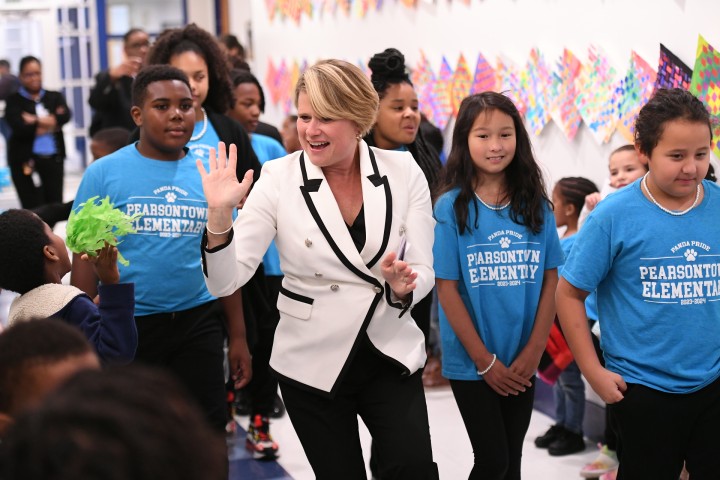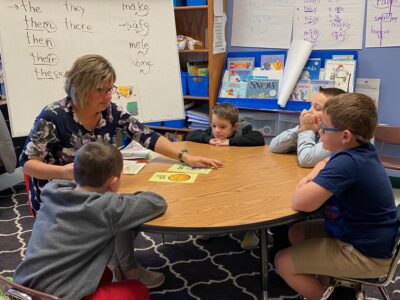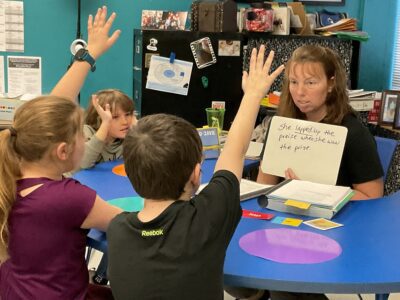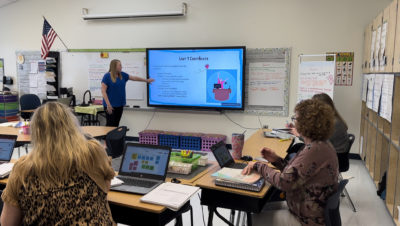
As we begin the new year, it is time to reflect on the year’s accomplishments and what is to come. Throughout this past year, the key priorities of the N.C. Department of Public Instruction (DPI) have centered on reading, readiness and reform.
I would like to take this opportunity to share the tremendous strides made in these priorities because of you and what to expect in the coming months as we embark on a new year.
Reading
2023 accomplishments
Recently, the Office of Early Learning shared some outstanding news attributed to the diligence and commitment of educators across North Carolina. Based on beginning-of-year testing data, North Carolina students outpaced their peers on a national level in grades 1-3, while grades K-3 have shown steady improvement since the implementation of a standardized early literacy assessment in the 2021-22 school year. I’m also proud to share that by the end of January, over 21,000 educators will have completed LETRS professional development to implement the science of reading across all public elementary schools in North Carolina. The collaboration between districts and early literacy specialists (ELS) is also celebration-worthy as the ELS’s have worked to provide seamless district- and school-level coaching, real-time feedback, and information to staff.
2024 outlook
Districts continue to work hard to ensure alignment to the science of reading through core curriculum adoptions, fidelity checks with current curricula, and making process improvements where gaps are identified. In addition to the incredible continued growth in reading outcomes, approximately 37,000 elementary educators will complete LETRS professional development by June 30, 2024. I’m inspired by the time and energy devoted by North Carolina’s teachers and administrators to honing their craft. Because of the hard work underway, and the systems and processes in place to sustain the momentum, I am positive that we will continue improving literacy outcomes for all students in our state.
Readiness
2023 accomplishments
In fall 2022, the DPI led the creation of the North Carolina Portrait of a Graduate along with help from the field to help drive better alignment between student preparation and workforce needs. The portrait identifies seven durable skills that students should possess upon graduation from high school so they can thrive in their pursuit of the post-high school plans of their choice, be it college, work, or the military. These seven durable skills include: adaptability, collaboration, communication, critical thinking, empathy, learner’s mindset and personal responsibility. In August, in partnership with educators across North Carolina, we developed rubrics, t-charts, and I can statements across grades K-12. We hope that these resources will support your work in the classroom.
2024 outlook
The next stage in the portrait of a graduate is designing activities that can help expose students to durable skills in hands-on ways. Educators from across North Carolina representing various grade levels and subject areas met in Raleigh to begin developing these activities, called performance tasks. The goal is to incorporate the durable skills via these performance tasks into existing state standards. I’m excited to see what comes of the peer review stage in the new year as we continue to help students engage, explore, and experience durable skills in action.
Reform
2023 accomplishments
Redesigning school performance grades (SPG) continues to be a priority for this agency, as we aim to give a more complete picture of all the amazing things happening in schools across North Carolina. Throughout 2023, our work has been three-fold, involving heavy communication and engagement with stakeholders, thorough research and discussion of possible indicators to be included, and finally design of a potential new SPG model. During the past seven months, hundreds of educational leaders from across the state (both charter and LEA) have met weekly to study each of the eight proposed indicators for validity, reliability, feasibility, and data collection practices. Outside of proficiency and growth metrics, the following indicators are being studied:
- 5-year graduation cohort,
- student group improvement,
- postsecondary preparation (aligned to a student’s chosen post-secondary outcome),
- postsecondary outcomes (employed, enlisted or enrolled),
- chronic absenteeism,
- NC Portrait of a Graduate’s durable skills,
- intra and extracurricular activities,
- and school climate.
2024 outlook
In the spring, a report will be presented to the N.C. General Assembly that details the findings of each working group on the indicators studied and their recommendation for next steps. The SPG leadership team will be meeting into the spring of 2024 to examine the findings in the report and develop a potential new model for consideration by the legislature that will give real visibility into what schools are doing to prepare students for life beyond the classroom.
What a year it has been!
While this is just a glimpse of the work happening at DPI, I cannot reiterate enough that this work would not be possible without each of you caring for and supporting students every day.
To our teachers
Your patience, enthusiasm, and willingness to go the extra mile is what makes our students’ learning experience memorable and meaningful. Your dedication sets a standard of excellence that will resonate with our students for years to come.
To our principals, assistant principals, charter leaders and superintendents
Your visionary leadership and commitment to creating a positive and inclusive educational environment have paved the way for student success. Your guidance has been instrumental in fostering a sense of community and pride within our public schools.
I’m incredibly honored to serve as your state superintendent and to have played a small role in this work. I wish you all a happy and healthy 2024, and I look forward to all we can accomplish in the year ahead.




